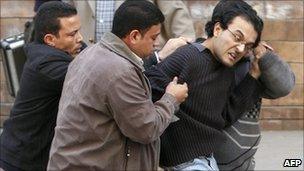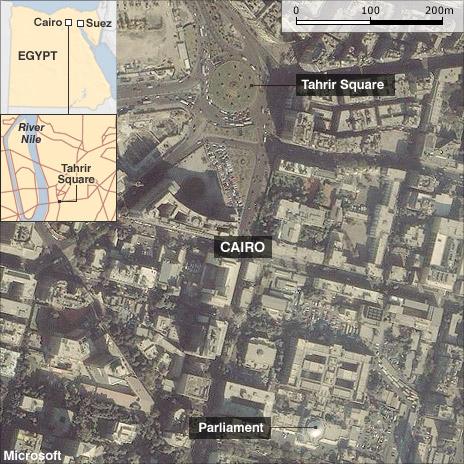Egypt braces for further day of protests
- Published
The BBC's Jon Leyne said protesters set fire to a government building in Suez
Authorities in Egypt are bracing for the possibility of further protests, following two days of unrest that have left at least four people dead.
On Wednesday night, activists remained on the streets of the capital, Cairo, and of Suez, defying official warnings.
The government says the protests are illegal and has launched a crackdown, arresting up to 1,000, reports say.
US Secretary of State Hillary Clinton has called on Egypt to "respond to the legitimate needs" of the people.
The country's stock exchange suspended trading temporarily after a sharp drop within minutes of opening, but its benchmark index has fallen further since re-opening.
The BBC's Jon Leyne in Cairo says that while the protesters are still only a minority of Egyptians, they show no sign of fading away and there is a chance that many more people will join once the working week finishes on Thursday.
The government appears to have no answer to the anger and disappointment being expressed on the streets, our correspondent adds - its only response so far has been to crack down on demonstrators and increase security.
The opposition figure, Mohamed ElBaradei - the Nobel Peace Prize-winning former head of the UN's nuclear watchdog - says he is returning to Egypt later on Thursday to take part in the protests.
"I am going back to Cairo and back onto the streets, because, really, there is no choice. You go out there with this massive number of people and you hope things will not turn ugly, but so far, the regime does not seem to have got that message," he said in remarks on US website The Daily Beast.
Many Egyptians would no longer tolerate Mr Mubarak's government even for a transitional period, he said, adding that the suggestion that authoritarian Arab leaders like him were the only bulwark against Islamic extremism was "obviously bogus".
"If we are talking about Egypt, there is a whole rainbow variety of people who are secular, liberal, market-oriented, and if you give them a chance, they will organise to elect a government that is modern and moderate."
'We won't stop'
The unrest began on Tuesday in what anti-government activists called a "day of revolt", inspired by the uprising in Tunisia which ousted President Zine al-Abidine Ben Ali.
On Wednesday, they staged fresh demonstrations in central Cairo, despite official warnings that anyone taking to the streets would be prosecuted.
"We've started and we won't stop," one demonstrator told the AFP news agency.
Protesters burned tyres and threw stones at police and there were scuffles outside the journalists' union building, where hundreds had gathered.
Police beat some protesters with batons and fired tear gas when they tried to break through a cordon.
In addition to the four dead, a policeman and a protester were reported killed in Cairo late on Wednesday, although the authorities said this was not related to the demonstrations.
In the eastern city of Suez, at least 55 people were injured.
Hundreds of protesters gathered outside the city's morgue, demanding the release of the body of a protester killed there on Tuesday.
Protesters set fire to parts of a government building in the city and attacked the headquarters of the ruling National Democratic Party.
The protests in Cairo continued late into the early hours of Thursday morning - small groups were reported to be breaking off from the main demonstrations, throwing stones at police who responded with tear gas.
About 700 people have been arrested across the country as the authorities have sought to rein in the unrest.
The Associated Press news agency says at least eight journalists are among those detained, including an AP cameraman and his assistant.
The agency says one of its photographers had his cheekbone fractured by a policeman while taking photos of a protest in Cairo on Wednesday.
US caution
The protest organisers have urged people to come out in force again after attending prayers in mosques and churches on Friday, stressing that the religion of protesters is not relevant.

At least 700 people have been arrested in the government crackdown so far
"Egypt's Muslims and Christians will go out to fight against corruption, unemployment and oppression and absence of freedom," Reuters quoted one activist as saying.
The pro-democracy April 6 Movement said it wanted to "continue what we started on 25 January".
"We will take to the streets to demand the right to life, liberty, dignity and we call on everyone to take to the streets... and to keep going until the demands of the Egyptian people have been met," the group wrote on Facebook.
The Egyptian government, ruled by President Hosni Mubarak since 1981, tolerates little dissent and opposition demonstrations are routinely outlawed.
But on Wednesday, Mrs Clinton said it was facing "an important opportunity to implement political, economic and social reforms that respond to legitimate needs and interests of the Egyptian people".
"We support the universal right of the Egyptian people, including the right to freedom of expression, association and assembly," she told reporters at the state department, calling on all parties to show restraint.
Egypt is a key political and military ally of the US in the Middle East, so Washington has been cautious in its response, but it has urged the authorities "not to prevent peaceful protests nor block communications, including on social media sites".
Sites including Facebook, external and Twitter have been key tools in organising the protests, but are reported to have been blocked across the country at times.
The BBC's Paul Adams in Washington says the US is clearly watching events on the streets of its most populous Arab ally with growing concern, fearing the potential of violent unrest at the heart of the Arab world.
Washington has been reliant on Mr Mubarak's autocratic regime for decades, but the unrest could now mean the US has to tread very carefully as it seeks to influence events in the region, says our correspondent.

- Published1 February 2011
- Published26 January 2011
- Published26 January 2011
- Published3 February 2011